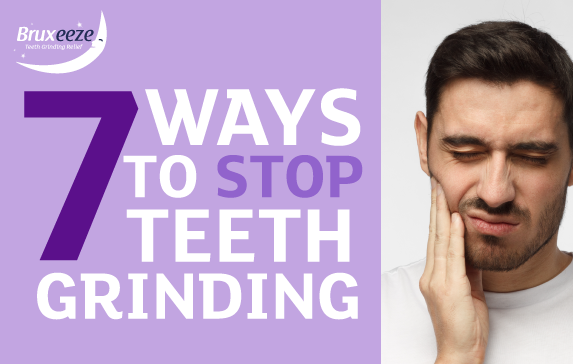What is bruxism?
Bruxism is a condition in which you grind your teeth or clench your jaw.
Symptoms may include:
- Worn-down teeth
- Headache
- Earache
- Increased tooth sensitivity
- Sore jaw muscles
- Broken teeth or fillings
Most people tend to grind in their sleep, however it can also take place in the day. The two main types of bruxism are nocturnal bruxism (occurs during sleep), and awake bruxism (occurs during the daytime). Awake bruxism is more common in women, whereas both men and women tend to be equally affected by sleep bruxism.
Why do I grind my teeth?
Bruxism can occur due to a combination of physical, psychological and genetic factors. The most common cause is stress and anxiety which counts for nearly 70% of cases. Lifestyle choices such as smoking and drinking are also associated with a higher risk of teeth grinding. Sleep bruxism is often a pattern in families, with 21-50% of bruxism sufferers having an immediate family member who also has the condition.
Depending on which factors are causing your bruxism, you may find that some techniques work better than others.
Why should I treat it?
Many people don’t realise they suffer from bruxism until they experience one or more of the symptoms above. If left untreated, the following effects may occur:
Long-term effects
- A painful jaw, which can lead to a condition called temporomandibular disorder (TMD)
- Worn-down or broken teeth, which can cause increased sensitivity and loss of teeth and fillings
Short-term effects
- Face, neck and shoulder pain
- Headaches
- Earache
- Disturbed sleep
How to stop grinding your teeth
1. Take a hot bath
Add a warm bath to your night-time routine. Hot water can help relieve the tension in your muscles since it causes the blood vessels to expand. This then increases the blood flow that carries extra oxygen and healing nutrients to your sore jaw area.
If you don’t have time for a bath, applying a warm compress can do the trick. Lie down and rest one side of your face on the heated pad. After 15 minutes, repeat on the other side of your face.
2. Avoid caffeine before bed
Instead of having a coffee to wind down, try non-caffeinated alternatives like herbal tea. This is a great way to naturally reduce stress, as caffeine increases your energy levels and heart rate, which can result in poor sleep and bruxism. Having a cup of chamomile tea will relax your body and mind, reducing the chances of teeth grinding and clenching.
3. Stop chewing anything except food
It may sound silly but chewing anything other than food will wear out your jaw. If you have a habit of chewing the end of a pen, or the ice in your drink, it’s time to think again. These repetitive motions will keep your jaw clenched.
4. Muscle stretching exercises
Doing certain exercises can help relieve jaw tension. Here’s a few to try:
- Whenever you feel jaw tension, practice making the “n” sound. This will keep your teeth from grinding and the jaw from clenching.
- Move the tip of your tongue to the front of your teeth, and open your mouth wide so there’s distance between the upper and lower teeth. Repeat 10 times.
- Smile as widely as you can, and slowly open your jaw also as widely as is comfortable, ideally an extra two more inches. Breathe deeply through your mouth and release on exhale.
5. Eat Magnesium-rich food
Magnesium is a critical mineral that helps the muscles to relax. Incorporating magnesium-rich foods into your diet could help prevent grinding caused by spasming or tight jaw muscles. This includes avocado, seeds, fish, dark chocolate, spinach, nuts and bananas to name a few. Magnesium supplements are also available, however we advise you to consult your doctor or a nutritionist first.
6. Meditate
Teeth grinding is often linked to mental health issues such as stress, anxiety and depression. Stress reduction techniques can not only reduce the chances of teeth grinding, they can also improve your overall health. Find a peaceful environment where you can sit comfortably, and let your thoughts and worries leave your mind. Click here to discover 30 meditation practices for you to try.
7. Use a night guard
If you grind your teeth whilst you sleep, using a night guard may help. The Bruxeeze night guard range is designed to stop your upper and lower teeth from grinding against each other. With both self-fit and custom options available, there’s a guard to suit every level of grinder.
Self-fit
Bruxeeze Self Fit Night Guard – Immediate and effective relief from teeth grinding symptoms. Easily moulded at home to fit your teeth in under 5 minutes, it can be worn on either your upper or lower teeth.
Custom-fit
Bruxeeze Slim Fit Night Guard – Ideal for first-time wearers and mild bruxers. 1.5mm thick with a discreet and almost invisible fit. Also a good choice for daytime bruxers.
Bruxeeze Pro Night Guard – Provides heavy-duty protection from the impact of teeth grinding and clenching with a thickness of 3mm.
Bruxeeze Pro Extra Night Guard – Offers an additional level of comfort than the Pro. 3mm thick and a perfect guard to treat moderate-to-heavy bruxing.
It’s best to treat bruxism sooner rather than later to keep your teeth in great condition.

